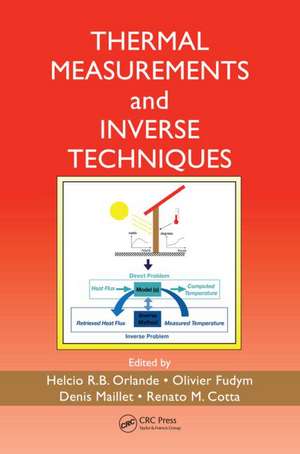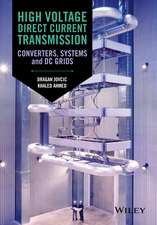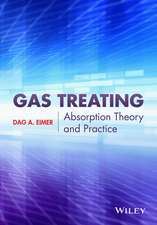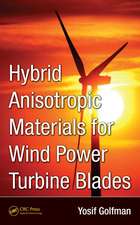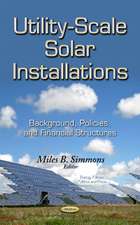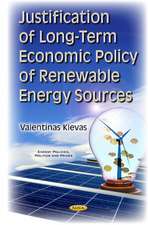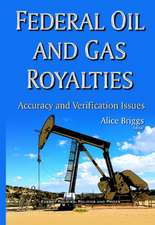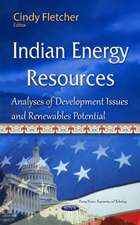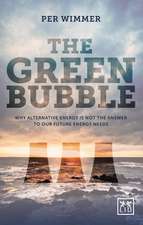Thermal Measurements and Inverse Techniques: Heat Transfer
Editat de Helcio R.B. Orlande, Olivier Fudym, Denis Maillet, Renato M. Cottaen Limba Engleză Hardback – 24 mai 2011
Progress in mathematical modeling of complex industrial and environmental systems has enabled numerical simulations of most physical phenomena. In addition, recent advances in thermal instrumentation and heat transfer modeling have improved experimental procedures and indirect measurements for heat transfer research of both natural phenomena and manmade applications. These new resources and methods help theoretical, computational, and experimental researchers synergistically interact to better understand the physical phenomena being studied. This book explores how inverse analysis can be used to increase understanding of interactions between technological systems and nature, by bridging the gap between data derived from measurements and information from theoretical predictions.
Assembled in three parts—Modeling and Measurements in Heat Transfer, Inverse Heat Transfer Problems, and Applications—this self-contained resource:
- Explores theoretical background and examples
- Outlines practical applications, including sample test cases
- Presents inverse techniques to estimate spatially and time-varying functions (such as heat sources, fluxes, and thermophysical properties), as well as constant parameters in heat transfer problems
Preț: 1228.03 lei
Preț vechi: 1678.81 lei
-27% Nou
Puncte Express: 1842
Preț estimativ în valută:
234.98€ • 245.100$ • 194.43£
234.98€ • 245.100$ • 194.43£
Carte tipărită la comandă
Livrare economică 05-19 aprilie
Preluare comenzi: 021 569.72.76
Specificații
ISBN-13: 9781439845554
ISBN-10: 1439845557
Pagini: 776
Ilustrații: 1343 Equations, 1 in text box; 74 Tables, black and white; 472 Illustrations, black and white
Dimensiuni: 171 x 241 x 50 mm
Greutate: 1.48 kg
Ediția:1
Editura: CRC Press
Colecția CRC Press
Seria Heat Transfer
ISBN-10: 1439845557
Pagini: 776
Ilustrații: 1343 Equations, 1 in text box; 74 Tables, black and white; 472 Illustrations, black and white
Dimensiuni: 171 x 241 x 50 mm
Greutate: 1.48 kg
Ediția:1
Editura: CRC Press
Colecția CRC Press
Seria Heat Transfer
Public țintă
Engineers and researchers working in aerospace, automotive and heating/air-conditioning, as well as composites design and testing industries; professors and students involved in graduate-level heat transfer.Cuprins
Modeling and Measurements in Heat Transfer
Modeling in Heat Transfer. A Multiscale Modeling Approach to Predict Thermophysical Properties of Heterogeneous Media. Temperature Measurements: Thermoelectricity and Microthermocouples. Temperature Measurements: Resistive Sensors. Heat Flux Sensors. Radiative Measurements of Temperature.
Inverse Heat Transfer Problems
Introduction to Linear Least Squares Estimation and Ill-Posed Problems for Experimental Data Processing. Inverse Problems and Regularization. Non-linear Estimation Problems. A Survey of Basic Deterministic, heuristic and Hybrid Methods for Single Objective Optimization and Response Surface Generation. Adjoint Methods. Bayesian Approaches for the Solution of Inverse Problems. Identification of Low Order Models and Use for Solving Inverse Boundary Problems. Karhunen-Loève Decomposition for Data, Noise, and Model Reduction in Inverse Problems. Explicit Formulations for Radiative Transfer Problems.
Applications
Analysis of Errors in Measurements and Inversion. Multisignal Least Squares: Dispersion, Bias, Regularization. Thermophysical Properties Identification in the Frequency Domain. Front Face Thermal Characterization of Materials by a Photothermal Pulse Technique. Estimation of Space Variable Thermophysical Properties. Inverse Thermal Radiation Problems: Estimation of Radiative Properties of Dispersed Media.
Modeling in Heat Transfer. A Multiscale Modeling Approach to Predict Thermophysical Properties of Heterogeneous Media. Temperature Measurements: Thermoelectricity and Microthermocouples. Temperature Measurements: Resistive Sensors. Heat Flux Sensors. Radiative Measurements of Temperature.
Inverse Heat Transfer Problems
Introduction to Linear Least Squares Estimation and Ill-Posed Problems for Experimental Data Processing. Inverse Problems and Regularization. Non-linear Estimation Problems. A Survey of Basic Deterministic, heuristic and Hybrid Methods for Single Objective Optimization and Response Surface Generation. Adjoint Methods. Bayesian Approaches for the Solution of Inverse Problems. Identification of Low Order Models and Use for Solving Inverse Boundary Problems. Karhunen-Loève Decomposition for Data, Noise, and Model Reduction in Inverse Problems. Explicit Formulations for Radiative Transfer Problems.
Applications
Analysis of Errors in Measurements and Inversion. Multisignal Least Squares: Dispersion, Bias, Regularization. Thermophysical Properties Identification in the Frequency Domain. Front Face Thermal Characterization of Materials by a Photothermal Pulse Technique. Estimation of Space Variable Thermophysical Properties. Inverse Thermal Radiation Problems: Estimation of Radiative Properties of Dispersed Media.
Notă biografică
Helcio Orlande and Renato M. Cotta are both with the Universidade Federal do Rio de Janeiro, Brazil.
Olivier Fudym is an Associate Professor in Heat Transfer at Ecole des Mines d'Albi, France, and the Coordinator of the "Energy Efficiency and Thermal Sciences" Research Group at RAPSODEE Research Center.
Denis Maillet is a Professor of Heat Transfer at Université de Lorraine and Coordinator of the Energy Research Group at the LEMTA-Lab in Nancy, France.
Olivier Fudym is an Associate Professor in Heat Transfer at Ecole des Mines d'Albi, France, and the Coordinator of the "Energy Efficiency and Thermal Sciences" Research Group at RAPSODEE Research Center.
Denis Maillet is a Professor of Heat Transfer at Université de Lorraine and Coordinator of the Energy Research Group at the LEMTA-Lab in Nancy, France.
Descriere
The use of inverse problems constitutes a new research paradigm in which groups of theoretical, computational, and experimental researchers synergistically interact to better understand the physical phenomena being studied. This book presents a comprehensive research-based survey of modern inverse techniques and their applications to engineering heat transfer. Written by top-notch contributors, the text provides a concise, single-source reference on the mathematical modeling, measurements, and solution of inverse problems in heat transfer. It covers topics such as multiscale modeling, thermophysical properties, heat flux, and temperature measurements.
